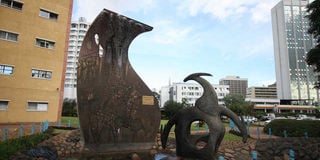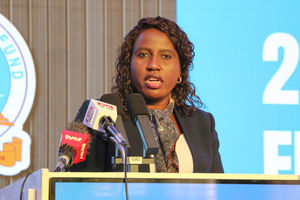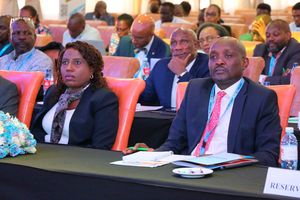
The fountain of knowledge at the University of Nairobi.
Public universities collectively owe Sh72.3 billion in unremitted deductions from academic and non-academic staff, salary arrears as well as pending bills to various suppliers.
The universities are now calling for the government to bail them out of the crisis. Debts owed by public universities stood at Sh60 billion in 2022 when Kenya Kwanza regime came to power, rose to Sh75 billion before coming down to Sh72.3 billion.
The details came out during Second Biennial Universities Funding Conference attended by stakeholders in higher education organised by the State Department of Higher Education. Attendees included vice chancellors, policymakers and private sector representatives.
A breakdown of the debts shows that Sh25.9 billion was deducted from staff salaries as pension for workers but never remitted to their pension schemes while Sh20 billion was deducted from their salaries as Pay As You Earn (PAYE) but never got to the Kenya Revenue Authority accounts.
Further, universities deducted Sh3.3 billion from workers as savings and loan repayments to their saccos but failed to forward the money. They have also Sh3.3 billion as unpaid debts to various suppliers.
Capital projects where money was spent but work stalled and therefore the projects remain unutilized have been valued at Sh5.1 billion. The Universities Fund (UF) has listed Sh5.6 billion as ‘other’ debts that public universities owe.
The revelations come against the backdrop of the uncertainty that surrounds funding for higher education.
A funding model that was introduced in 2023 and hailed as the panacea to the crippling debts was declared unconstitutional by the High Court. The government has appealed against the ruling.
“We are looking at diversification of revenue streams in universities. Universities should also enter into private public partnerships (PPPs) to improve their infrastructure including things like construction of hostels for students,” said Geoffrey Monari, the CEO of the Universities Fund.
He urged universities to tap into is consultancy services by academic staff to provide the expertise required in various sectors.
Mr Monari noted that there is lobbying going on for government institutions to make exclusive reservations for consultancy services to public universities.
“We are lobbying so that universities will be able to provide consultancy at maybe 30 per cent of government services,” he revealed.
Former university don and member of the National Assembly Education Committee Dr Christine Ombaka emphasised the urgency of finding new revenue streams.
“Public universities are choking in debt. They must tap into their land and properties to generate alternative income, clear debts, and uplift their institutions to global standards,” she said.
“Universities just need to take a pragmatic approach of wisely utilising their properties and financial constraints will be a thing of the past,” added Dr Ombaka.
Participants noted the irony of universities sinking in debt when they own properties worth billions of shillings.
The University of Nairobi, for instance, has properties valued at more than Sh200 billion, while Moi University has leased out 1,500 acres of its 3,000-acre land in Eldoret to a private developer.
The deal has since come under investigation by the Ethics and Anti-Corruption Commission (EACC) after the investor failed to pay rent.
Egerton University which operates an expansive agricultural programme, also has large sections of land that remain idle.
Beyond land, universities own a range of commercial properties including hotels and malls which remain largely untapped as potential sources of revenue.
Members of the Education Committee challenged VCs to consider adopting alternative funding streams beyond government allocations and tuition fees.
“To achieve long-term financial sustainability, universities must explore alternative sources of funding through use of their vast lands and properties and commercialisation of research. Universities cannot continue relying on the Exchequer,” stated Kitutu Masaba Member of Parliament Clive Gisairo.
“To address the growing financial challenges in higher education, universities must also adopt innovation in financing to counter economic pressures and the increasing demand for higher education,” he added.
Others solutions suggested include adoption of renewable energy to cut costs of electricity bills, leveraging on alumni contributions, endowments among others.
The Principal Secretary for Higher Education Dr Beatrice Inyangala said that the government was exploring mechanisms to incentivise the private sector, to contribute to research.
“The ministry plans to increase grant levels issued to universities to sustain training programmes and raise funding for research. Some of the proposals being considered by the Ministry of Education include performance-based funding to eradicate systemic issues and enhance the quality of education countrywide and development of centres of excellence to establish and promote technical, research, agricultural and applied universities,” she said.
According to a communiqué from the VCs at the end of the conference, research work by local scholars should be marketed in international peer-reviewed journals to increase their edge.
They also called on the government to change policy to provide for tax waivers on eligible research grants and donations and improve university linkages.
“The unremitted pension arrears mean if our lecturers retire in the coming years, we will not have anything to give them. They will retire on empty hands. The pension crisis, now poses a huge challenge in the social security of the employees who may retire without pension,” revealed Mr Monari.











